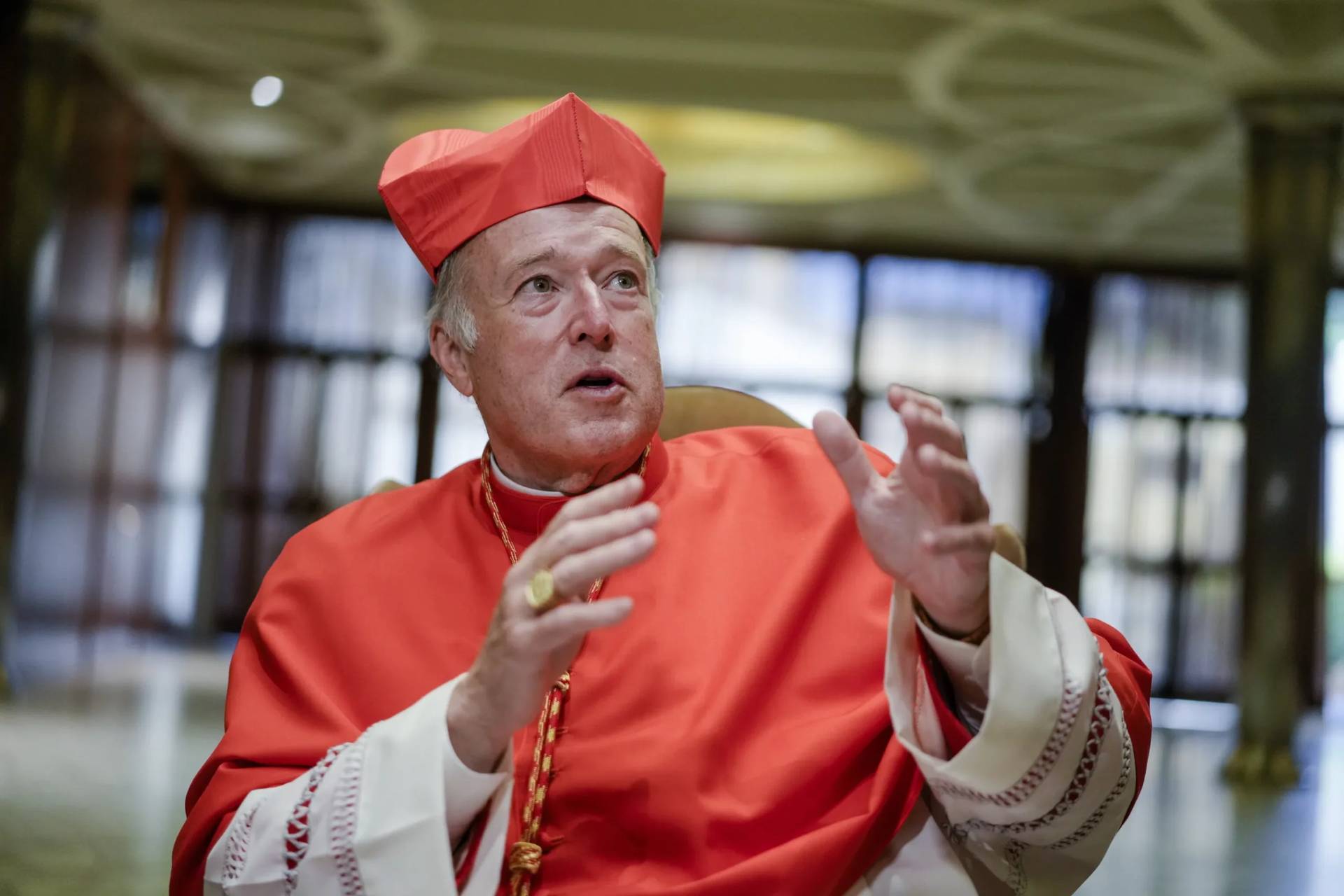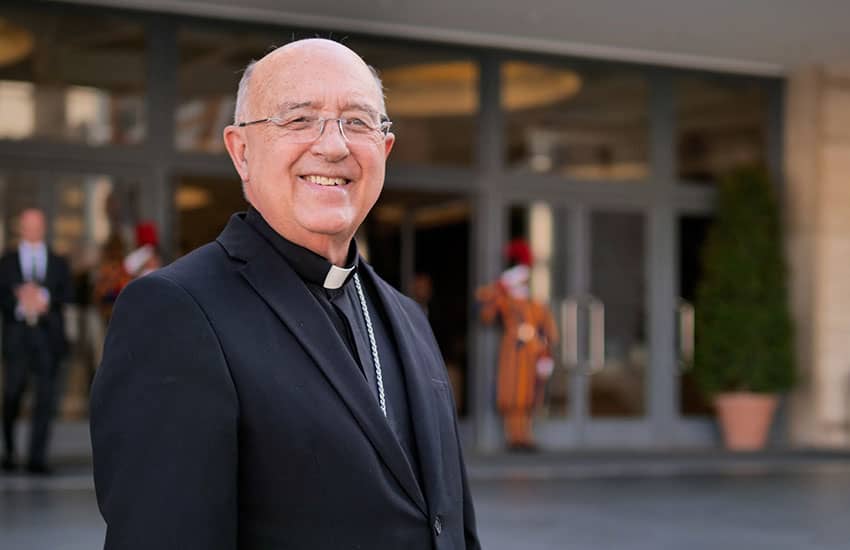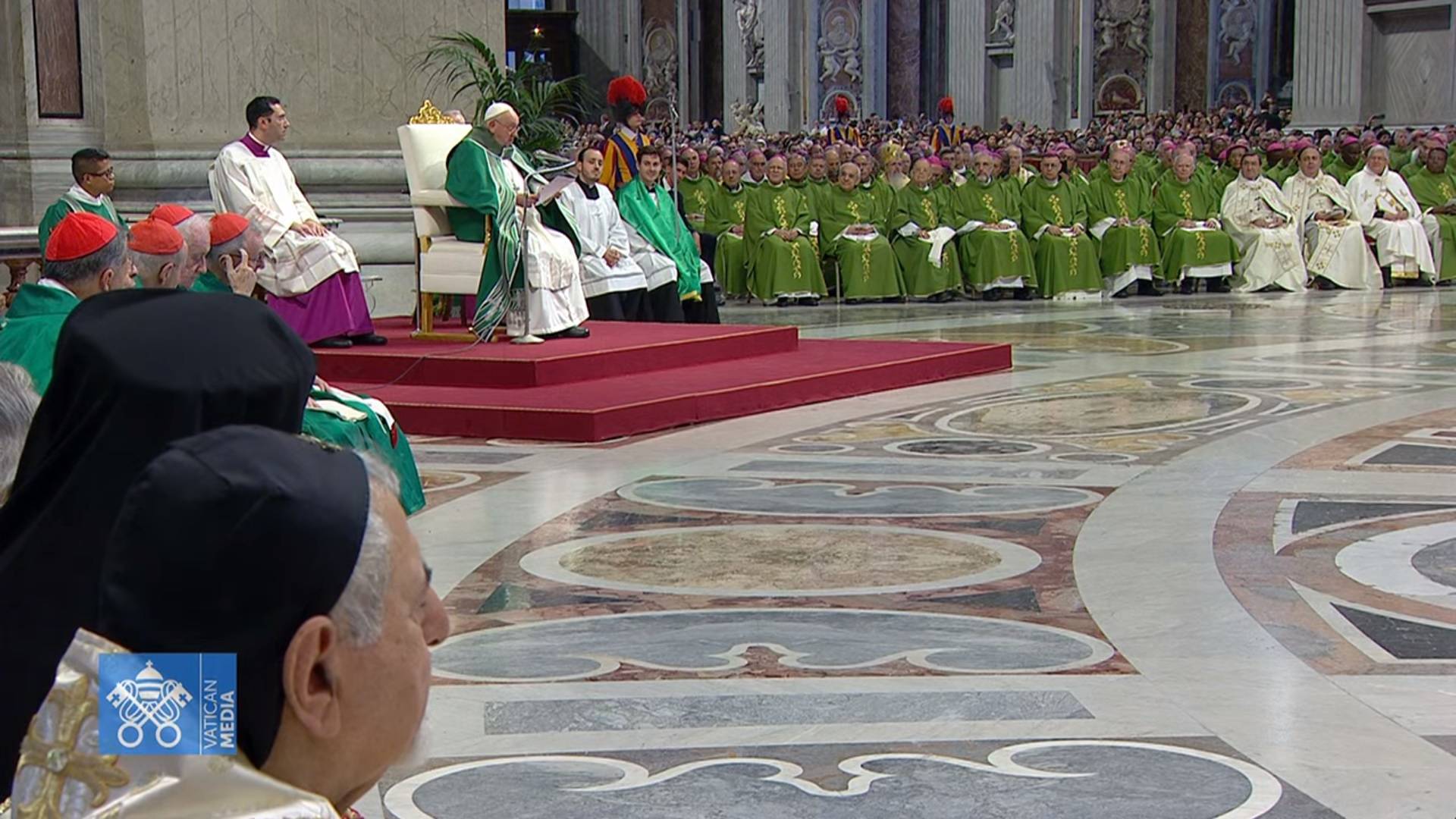ROME – A celebrated prelate who helped write the Catechism of the Catholic Church, and who’s widely recognized as being among the Church’s top theologians, upheld Church teaching on LGBTQ+ issues on Friday but also said the pope has the power to change the catechism’s language describing homosexuals as “disordered.”
Austrian Cardinal Christoph Schönborn of Vienna also pointed to the weakening of European Catholicism, saying the global south – Churches in Africa, Asia and Latin America – is becoming the new center of the Church.
Schönborn participated in an Oct. 23 press briefing during the pope’s Synod of Bishops on Synodality, which is set to close the first of two Rome-based gatherings that will culminate in October 2024. He spoke alongside Cardinal Carlos Aguiar Retes, Archbishop of Mexico; Cardinal Jean-Marc Aveline, Archbishop of Marseille; and Sister Samuela Maria Rigon, Superior General of the Sisters of the Holy Mother of Sorrows.
Asked about LGBTQ+ individuals who feel hurt and disrespected by the catechism’s description of homosexual acts as “intrinsically disordered” and whether that language could be changed, Schönborn, who served as secretary of the catechism’s drafting committee, said the catechism has been changed before.
“It’s a work of the Church and it has been promulgated by the pope,” he said, saying Pope Francis has the authority to change it and that he did so once before when, in 2018, he decided to revise the Church’s position on the death penalty, changing the language of the catechism to say that capital punishment is “unacceptable.”
“It is no secret, and I can say so, John Paul II already wished that the death penalty would be explicitly condemned, then I was told that Pope Francis took action and introduced this change,” Schönborn said, noting that St. Theresa of Calcutta had also asked John Paul II to more explicitly condemn the death penalty in the catechism.
In terms of whether there will be further changes, Schönborn said he does not know, and that “the pope is the only one who can decide, because he’s the one who promulgated the catechism.”
Schönborn recommended that the text of the catechism be read “as a whole,” and pointed to the portions saying all people must be respected in their human dignity.
Drawing on aspects of moral theology, he said there are two main elements, one being “an objective order” in terms of the immutability of Church teaching, and there are also “human beings,” who as sinners fall short of God’s design.
“Human beings always have the right to be respected, even though they sin, which we all do. I personally, you, all of you, we all sin, but we are entitled to be respected, we have a right to be respected,” Schönborn said, saying every person is accepted by God, and their spiritual journey depends on their history and whether “this person wants to be accompanied.”
LGBTQ+ issues have been a major point of interest during this month’s Synod of Bishops, and is one of the most frequently asked about topics alongside other hot-button issues such as women’s priestly ordination and the married priesthood.
Participants selected by synod organizers to brief the media in daily press briefings have collectively said there will be no concrete decisions on these or other issues at the end of the Oct. 4-29 discussion, which will wrap up this weekend, and there might be no decisions made at the end of next year’s gathering, which will formally close the process.
Rather, participants have said that the discussion itself, aimed at learning, practicing and implementing synodality – a form of consultative and inclusive governance – is the most important aspect of the synod.
In Monday’s briefing, participants each spoke about their own experiences of the synod and highlighted initiatives in their own local regions and dioceses.
Schönborn praised the methodology of this month’s gathering, which for the first time includes women and laypeople generally as full voting members, and which is structured around small group discussions that take place at a round table, rather than the previous synod hall with auditorium-like seating that was largely divided by ecclesial rank.
He voiced his belief that synodality is a continuation of the Second Vatican Council’s teaching on ecclesiology and the nature of the ecclesial community as composed of all baptized persons “journeying together.”
One thing Schönborn said that has struck him throughout the synod process is “the fact that Europe is no longer the main center of the Church.”
“There are other centers, and this is evident from what we live in the daily meetings of the synod,” he said, and pointed to the Churches in Latin America, Africa, and Asia.
Continental bishops’ conferences in these regions are more developed than in Europe, he said, noting that the Council of European Episcopal Conferences (CCEE) “was unable to have the potential that the FABC was able to develop, it hasn’t been as able to develop as they have, so it’s a bit of a criticism,” he said, referring to the Federation of Asian Bishops Conferences, the continental ecclesial body for Asia.
Europe, he said, is “lagging behind a bit in the way in which we live synodality among the local churches in Europe. I think we need some stimulus to move forward,” Schönborn said, noting that European bishops’ conferences have never been able to speak with a unified voice on the issue of migration, “and this is sad.”
“Politicians are unable to do that, they don’t know how to do it, and we the Catholic Church, we are unable to come up with a common stance,” he said, and also stressed the need to forge closer ties to the Eastern Catholic Churches, who have an ancient tradition of synodality that is rooted in the liturgy.
Aguiar Retes spoke of his own synodal process in Mexico, saying they launched a local synodal process of listening and dialogue with the diocese’s 426 parishes after the COVID-19 pandemic and are beginning to evaluate the results.
“We will be sharing this in order to answer and respond to the needs that exist in our society,” he said, saying this approach of bringing everyone together and listening to all of their voices is essential, otherwise “we will become small groups of Catholic faithful, as unfortunately is happening in some countries.”
Asked if this month’s synodal discussion and the implementation of synodality will be considered in the next conclave, and in what way, Aguiar Retes said that “if we put into practice what we have defined here, what we have discussed and experienced, I think there is a path before us.”
“Unless we do this, if we just listen and don’t reach daily life with our responsibilities, nothing is going to happen. Everything really depends on us and what we do when we go back to our diocese, when we put into practice what we’ve been saying, what we expect as a Church in the future,” he said.
In terms of the synod’s working method of listening, reflection and dialogue, Schönborn said it has been helpful and recalled a conversation about synodality with American economist Jeffrey Sachs, who is a member of the Pontifical Academy of Social Sciences.
In that conversation, Schönborn said, Sachs confided that “if only the United Nations Security Council were to do this, were to adopt this method, then maybe we would have a bit more peace in the world,” as everyone comes to the security council with their own private agenda and instructions from their government.
Sachs’s view, Schönborn said, was that “they all say their own thing and there is no exchange. How can we move forward, go on without such a methodology as you adopted?” This method, he said, “is clearly the right one and it’s also necessary.”
Maria Rigon said she likes the methodology and has appreciated it “because everyone had the opportunity of sharing and being heard, of listening. Everyone could express their opinions, everyone was listened to respectfully, we could all pray on what we heard and share, and we could express opinions. I think this is very constructive.”
Asked about those who question the integrity of the synod since it has been opened to laypeople as delegates, arguing that it is no longer a synod of “bishops,” Schönborn said, “I can’t see the problem.”
“It remains an episcopal synod with real participation of non-bishops, but it’s a real participation,” he said, noting that the synod was created by Pope Saint Paul VI as “a consultative organ for the exercise of papal ministry,” and that this aspect “does not at all diminish the width of votes.”
“Whenever we have voted in a synod, we have voted something we consider important for the Holy Father to consider, to consider it for his own magisterium, in collegiality with the bishops, in communion with the whole Church and mainly in communion with the faith of the Church, which is neither invented by the pope nor invented by the synod, which is the faith of the apostles we all share,” he said.
Schönborn said the nature of the synod has not changed, but has rather been “enlarged,” and that synods have always been attended by lay experts. Their more formal contribution, he said, has been “a very positive experience.”













